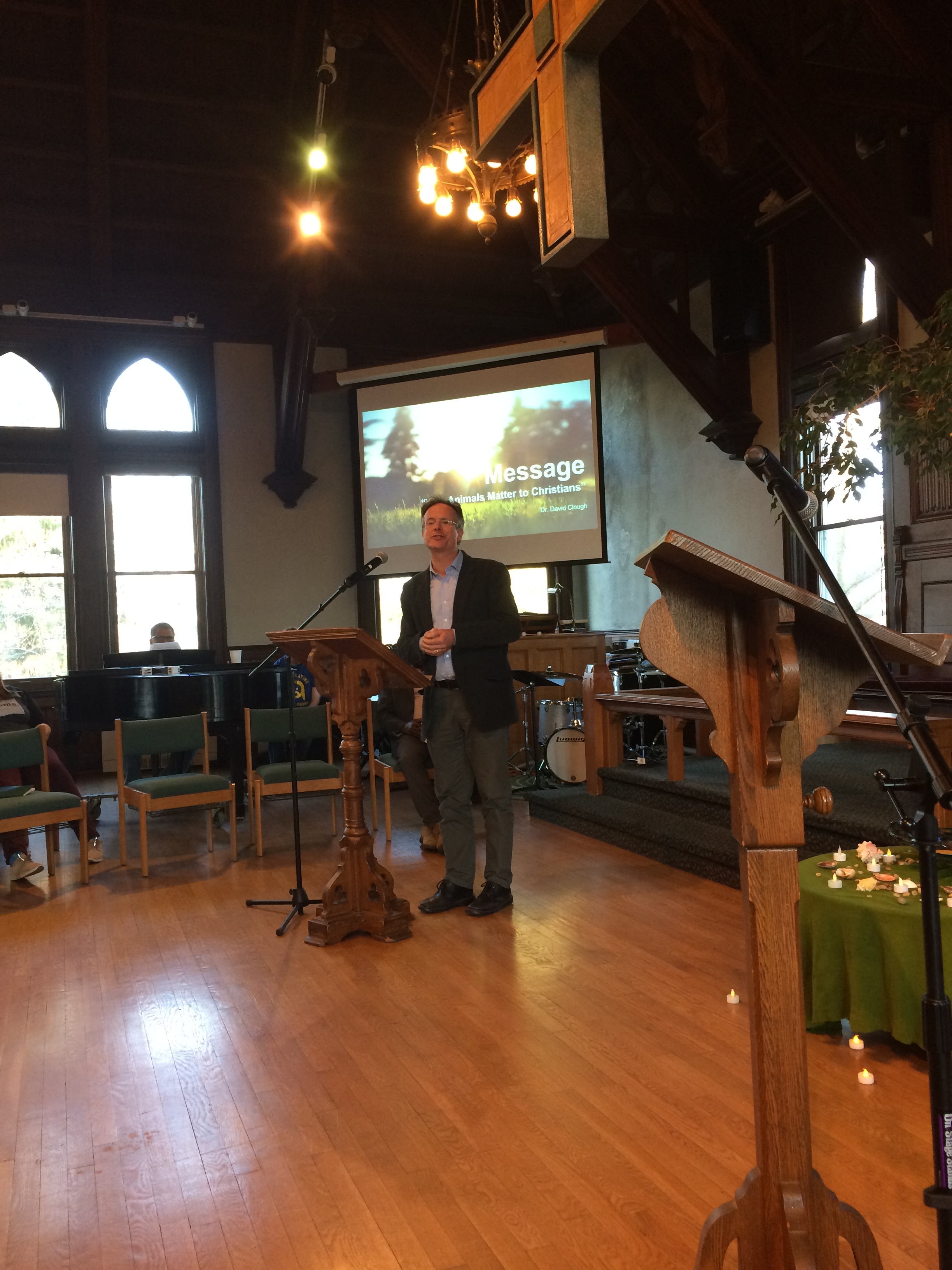by David Clough
Aphro-ism by Aph Ko and Syl Ko is essential reading for all animal advocates.
When I started writing about Christianity and animals I confess that I didn’t see the connection with race and white privilege. I was sympathetic to the idea that some theologians and Christian ethicists should be working on race, but I thought I could let them get on with that while I pursued my own research on animals. I’m now convinced that view was not only wrong, but dangerous, and that my resistance as a white, male, British theologian to attending to race in my own work was part of a long destructive pattern in the academy and beyond that perpetuates racism and white supremacy. So it seems to me worth outlining why I now think Christian theologians and ethicists who write on animals — along with others — need to engage the connection with race, and why CreatureKind is committed to taking that intersection seriously.
I’m now convinced that view was not only wrong, but dangerous, and that my resistance as a white, male, British theologian to attending to race in my own work was part of a long destructive pattern in the academy and beyond that perpetuates racism and white supremacy.
First, those who work on Christianity and animals share a general obligation with those working in other fields to avoid reproducing academic debates that have ignored the voices of black and brown theologians. Since my own academic formation inducted me into an overwhelmingly white theological discourse, if I don’t attend seriously to which theological voices I’m listening to, I will inevitably be playing my part in ensuring that the status quo continues and only white voices are centred in the canons of my discipline. That will ensure the interests of students of colour continue to be excluded from the curricula for which I’m responsible and the work I publish, which contributes powerfully to ensuring that whiteness will continue to be privileged in the future academy. This isn’t only socially unjust, but is also clearly defective academically in the partial and selective account that results. Race is a crucial component of the academic malformation I and others similarly situated need to work to overcome, but is obviously not the only one. We could start the list of additional intersections with gender, sexuality, disability, socio-economic status, class, global location, and so on, though it is important to note that people of colour suffer disproportionately within each of these categories, too.
Second, there is a particular offensiveness in white people showing compassion towards non-human animals while ignoring the suffering of black and brown people. At a panel on the intersection between race, gender, theology and animals at the American Academy of Religion in 2018, Jeania Ree Moore, United Methodist Church Director for Civil and Human Rights, described the reaction among African Americans to how white people responded to the killing of Cecil the lion in Zimbabwe in 2015 by an American recreational big-game hunter. Black commentators complained of white news anchors shedding tears on air for Cecil when they hadn’t been similarly moved by the killing of black people by the same weapon. Roxane Gay tweeted: “I'm personally going to start wearing a lion costume when I leave my house so if I get shot, people will care.” Addressing the plight of non-human animals without showing awareness of how white supremacy functions to subject people of colour disproportionately to violence, injustice, and poverty risks making concern for animals part of the distraction tactics that persuade white people they don’t need to think about race.
Third, it turns out that there is a strong connection between the construction of human supremacy over non-human others, and the construction of white supremacy over non-white others. This is most acutely set out in Aph Ko and Syl Ko’s book Aphro-Ism: Essays on Pop Culture, Feminism, and Black Veganism From Two Sisters. The Ko sisters argue persuasively that whiteness functions as the norm for humanity, and blackness is characterised by distance from this norm. This is clearly exemplified in the long history of racist abuse that identifies black people with non-human animals such as gorillas or monkeys. Peter Fryer’s Staying Power: The History of Black People in Britain documents the long history of this trope in British racism, the continued currency of which is seen in a Tottenham fan throwing a banana at Arsenal’s Pierre-Emerick Aubameyang during a football game in 2018. Analyses of the intersection of theology and race by J. Kameron Carter and Willie Jennings support the case that universalized accounts of humanity frequently make whiteness definitive of the human, and render non-whiteness sub-human. Engaging the human/animal binary without attending to its relationship with the white/black binary misses the crucial connection between racism and abuse of non-human animals.
Fourth, unjust treatment of black and brown peoples and other-than-human animals intersects practically. Examples here are unending, but we could start with the repeated pattern of indigenous people growing arable crops being displaced by colonial domesticated animals; the environmental racism of situating polluting industrial animal agricultural sites disproportionately in places where black and brown people live (such as pig farms in North Carolina); the demography of workers in slaughterhouses and meat-packing plants, who are disproportionately black, brown, migrant, undocumented, and female; the urban contexts where the unhealthy animal products of subsidized industrial animal agriculture are the only affordable options for poor inhabitants who are disproportionately black and brown. The frequent association between the exploitation of non-human animals and racial injustice means that addressing animal welfare in isolation often neglects racial oppression.
For all these reasons it seems to me crucial that Christian theologians and ethicists working on animals are attentive to the way the issue intersects with issues of race and white supremacy. This is a road I’m committed to walking, but I am late setting out on it and haven’t yet progressed far. On Animals Volume 1 doesn’t show much evidence of attention to the issue. Volume 2 does pay attention to the intersection but could usefully have done more. CreatureKind is also on this journey. We’ve had helpful feedback that the course material in the current version of our course on Christianity and Animals for church small groups draws only on white voices from within the tradition and doesn’t make connections with racial justice. We should have recognised that when we put the course together four years ago, and we’re committed to a second edition of the course that addresses these concerns. As we build the organization we’re committed to ensuring that people of colour are part of the leadership of CreatureKind and our board. We've produced an intersectional resource list of academic resources addressing the intersection between animal issues and other issues, including race. There’s more we can do and more we will do, and we hope to learn well and quickly from the mistakes we will inevitably make.
There's a risk that white advocates for animals and other good causes feel that they have an excuse for not engaging with race or other intersectional issues because their cause is all-important. Carol Adams called this attitude out in relation to gender in her acute lecture at Harvard Law School on #MeToo and the animals movement. There's no free pass here: thinking, writing, and advocating well in the Christianity and animals space requires talking about race in order to avoid being part of the problem.








